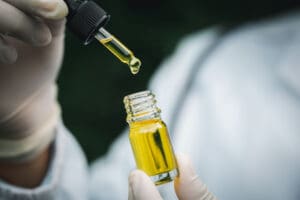Introduction
Since the legalization of recreational cannabis in Canada and several US States, it’s use in pregnancy has increased. In the US its estimated cannabis use during pregnancy has increased from 1.95% to 7%1. The question on many people’s mind is; how does cannabis affect the baby during pregnancy and breastfeeding? Is it a positive impact, negative or benign? The following article will evaluate published clinical research and provide insights about cannabis and it’s use in pregnancy.
Can cannabis effect your ability to get pregnant?
Before we discuss if cannabis can affect a baby’s development, it’s important to know if cannabis can impact the ability to conceive. There are only a few studies researching this topic and they have conflicting results. Early studies used survey data to verify if new mothers had been using cannabis prior to conception. These earlier studies suggested that cannabis use does not impact the ability for women to get pregnant2. However, many women don’t disclose their cannabis use due to stigma2 which likely affected the validity of these studies.
To address this issue, author Mumford and his team designed a study that evaluated if cannabis can affect a women’s ability to get pregnant, titled “Cannabis use while trying to conceive: a prospective cohort study evaluating associations with fecundability, live birth and pregnancy loss”. The made sure to use a urine drug screen to confirm cannabis use. The participants of the study were women between the ages of 18 to 40 with a previous history of pregnancy loss. The time to achieve pregnancy and the incidence of a live birth or pregnancy loss was monitored. A few interesting conclusions came from this study:
- More than 50% of women who used cannabis did not self report it on the survey2. This highlights how social stigma is still present in society and may cause patients to avoid reporting cannabis use in the context of pregnancy.
- Cannabis use resulted in a 41% reduction in ability to get pregnant compared to non cannabis users2.
- This result remained significant when adjusting for parity, income, employment status and stress.
- It’s hypothesized that certain molecules in cannabis can reduce the release of an important ovulatory hormone, GnRH2. This may be the key mechanism of action that reduces pregnancy viability.
- Cannabis use was associated with more frequent intercourse among partners2. This may be an indicator of increased libido associated with cannabis use.
There is very little research evaluating how cannabis may affect men’s fertility either positively or negatively. Which is something else to consider in couples trying to get pregnant.
Can cannabis effect a growing fetus?
This is one of the more controversial topics in cannabis news and social media. The issue is that there is not enough published evidence to prove if cannabis is safe or dangerous in pregnancy. This has allowed for a lot of speculation and spread of false information. Older studies suggest that children exposed to cannabis in utero had reduced attention and concentration3. However, many studies don’t take into account other confounding factors3 that may obscure the data, such as socioeconomic status, other substances use, genetics etc. It’s hypothesized that cannabinoids exposure to the fetus can interact with the developing endocannabinoid system and cause defects3. Specifically, it may damage the neuronal wiring which affects the brain3.
A new study “Maternal cannabis use in pregnancy and child neurodevelopmental outcomes” published in 2020 by Corsi et.Al looked to address this issue by evaluating if cannabis use in pregnancy affects neurodevelopmental outcomes in children. They looked at 503,065 births in Ontario between April 1 2007 to March 31 2012 and analyzed the data. Key findings from the study:
- Children with prenatal cannabis exposure had a 50% increased risk of having an autism diagnosis3. These results were statistically significant.
- There was also a 11% to 22% increase risk of developing other intellectual disabilities, learning disorders and ADHD in children exposed to cannabis during pregnancy3. However, these numbers did not reach statistical significance. This means these results are not robust because theoretically the results could have occurred due to random chance.
One key element to understand about this study is that the analysis finds correlation in data. Correlation does not mean causation. The findings from this study are concerning but may be indicative of other factors that were not captured in the data set. It’s important for more research to be conducted so that clinicians can understand exactly how cannabis effects the development of a fetus.
Does cannabis effect a breastfeeding baby?
Research has shown that cannabinoids collect in breastmilk; THC accumulates 8 times higher in breastmilk compared to in the blood4. Maximum levels of THC accumulate in breastmilk approximately 1 hour after inhalation4. Therefore, women who use cannabis while breastfeeding will likely expose their newborns to cannabinoids such as THC, CBD and other metabolites.
Determining if cannabis exposure via breastfeeding affects a child’s development is exceptionally difficult since it’s almost impossible to separate cannabis from particular parts of the pregnancy journey. For example, one study found that 84% of women who used cannabis during pregnancy also used cannabis during breastfeeding4. This means women who use cannabis during pregnancy will likely continue to use it while breastfeeding; both types of exposures have the potential to impact the growing child.
Conclusion
Overall, there still needs to be more research in the area of cannabis and pregnancy. There are too few studies to definitively come to any conclusion regarding the safety of cannabis in pregnant women. However, the author of this article and most healthcare professionals would not recommend cannabis use during pregnancy and breastfeeding. We know cannabis effects the endocannabinoid system which plays an important role in brain development along with many other functions in the body. Making changes to that system during early development of a child is a large risk that needs to be considered. With more information being published every day, hopefully a clear understanding of how cannabis working in pregnancy will be clarified.
Bibliography
- di Giacomo E, Pessina R, Colmegna F, et al. Cannabis and Pregnancy: A Psychiatric, Medical, or General Population Issue?. Eur Addict Res. 2021;27(2):156-160. doi:10.1159/000512155, 10.1159/000512155
- Mumford SL, Flannagan KS, Radoc JG, et al. Cannabis use while trying to conceive: a prospective cohort study evaluating associations with fecundability, live birth and pregnancy loss. Hum Reprod. 2021;. doi:10.1093/humrep/deaa355, 10.1093/humrep/deaa355
- Corsi DJ, Donelle J, Sucha E, et al. Maternal cannabis use in pregnancy and child neurodevelopmental outcomes. Nat Med. 2020;26(10):1536-1540. doi:10.1038/s41591-020-1002-5, 10.1038/s41591-020-1002-5
- Ordean A, Kim G. Cannabis Use During Lactation: Literature Review and Clinical Recommendations. J Obstet Gynaecol Can. 2020;42(10):1248-1253. doi:10.1016/j.jogc.2019.11.003


